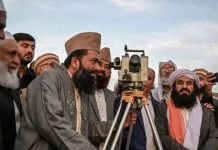Shamim Shahid
PESHAWAR—The Afghan Taliban calling them as Emirate Islami Afghanistan has honoured one of the notorious militant commander with Governor office in recently announced posting and appointments.
The decorated militant commander Qari Ihsan Ulllah Baryal is one amongst the lucky Taliban commanders and self-styled Ulema whom appointments decree was issued by Taliban supreme leader Mullah Haibat Ullah Akhund.
Though some of media organs in previous September reported Mullah Haibat Ullah appearance during a ceremony at Southern Qandahar city of Afghanistan but so far no either confirmed his physical participation in any official meeting or other events. Like of Taliban founding supreme leader, Mullah Muhammad Omar Akhund, Mullah Haibat Ullah avoiding to be either picturised or filmed for media consumptions.
Recent media report reveal that Taliban leadership has notified a number of new posting and appointments in civil administration and security forces for different parts of the country. According to notification Abdul Ghaffar Muhammadi was appointed as Deputy Commander of Al Badar Corps, Maulvi Younas Mukhlis was named as Deputy Governor of Kabul, Mufti Muhammad Idrees was made as Deputy Governor of Parwan Province, Maulvi Aziz Ullah was made Parwan Police Chief and Qari Naeem would command the police force in Baghlan province.
It further states that Qari Ihsan Ullah Baryal was named as Governor of his native Kapisa province. Qari Ihsan Ullah Baryal was earlier associated with Hizbe Islami Afghanistan headed by Engineer Gulbadin Hekmatyar but later switched over to Tehrik Taliban Afghanistan soon after Taliban’s embarking on what they called armed offensives against the US led allies or NATO troops in 2004.
At once residing along with his family members and close relatives in Shamshato Refugees Camp in outskirts of Peshawar, Qari Ihsan Ullah become notorious when he either claimed or charged for deadly attack against the French troops in Tagao valley of Kapisa province in 2008 last. At least 10 personnel of France armed forces, a component of NATO forces killed in the first ever attack. In the second suicide attack, at least four French troops were killed. The suicide bomber guessed him as woman or wearing Burqa, had also targeted the French convoy in same Tagao valley of Kapisa province, adjacent to Sarobi district of Kabul province, located on main Grand Trunk Road, connecting Kabul with Calcutta India via Peshawar, Lahore and New Delhi.
Besides declaring Qari Ihsan Baryal is most notorious militant and putting him on priority in the UN black list, a French court had also started investigation into 2008 deadly attack in Afghanistan. The court reaffirmed of continuing the investigation after another suicide attack against the French troops on June 9th 2012 last. “A French judge is to continue his probe into the deaths of 10 French soldiers in an ambush in Afghanistan in 2008, following an appeals court ruling Monday. The families of the victims claim the soldiers were ill-equipped at the time of the attack.
( Old story)
AFP – A judge will investigate the killing of 10 French soldiers in a 2008 ambush in Afghanistan after their families accused military commanders of negligence, a French appeals court ruled on Monday.
The court said investigating judge Frederic Digne could continue his probe, opened last year, after prosecutors had appealed against the investigation.
The families filed a civil complaint for “endangering lives” and “failing to prevent a crime” over the ambush, which saw 10 soldiers killed and 21 wounded after Taliban guerrillas ambushed a patrol in Uzbin, east of Kabul.
Media reports have quoted classified French and NATO documents that concluded the soldiers were poorly equipped and ill-organised. French authorities have denied this.
“This is a relief because, through the prosecutor’s office, the state had been doing everything possible for this investigation not to be opened,” said Gilbert Collard, a lawyer for the family of one of the dead soldiers.
“We had to fight, but we will finally know how these young soldiers were killed, how they were sacrificed.”
Collard said he would call for a number of witnesses to be questioned and for a classified report into the ambush to be made public.
The ambush saw Taliban fighters attack a convoy of about 100 NATO soldiers, mainly French, on patrol in a mountain pass and pin them down with machine-gun, sniper and mortar fire.
NATO forces managed to regain control of the area after a nine-hour battle and the arrival of reinforcements.
Media have quoted both French and NATO reports saying the soldiers lacked ammunition and communication equipment. Reports have also cited a lack of air reconnaissance and surveillance.
In their complaint, the families claimed the soldiers suffered from “a clear lack of means” and that “some officers were not up to their mission”.
“We have never said that a soldier does not face his possible death when he puts on a uniform,” Collard said.
“But we have always said that no one has the right to send soldiers to their death without giving them the means to defend themselves, without giving them the means to escape from a trap created by negligence and by carelessness.”
France’s defence ministry has previously raised concerns that the judicial probe would open the door to legal action being taken in other cases of military losses.
Reacting to Monday’s decision, Defence Minister Gerard Longuet said he would study the ruling but appeared to suggest that the conduct of military operations should not be subject to legal challenge.
“The army is subject to the law, so it is normal that it gives an account. However, it has always been recognised that the conduct of operations is a unique exercise,” he said on France Inter radio.
At the time the ambush marked the deadliest attack on NATO forces in Afghanistan since the fall of the Taliban at the end of 2001.
The court’s ruling came as France prepares to draw down its presence in Afghanistan and after recent deadly attacks on French troops, including the killing earlier this month of four French servicemen by a renegade Afghan soldier.
President Nicolas Sarkozy announced Friday that France would be withdrawing its 3,600-strong contingent from Afghanistan by the end of 2013, a year before the international deadline of 2014.
A total of 82 French troops have been killed in Afghanistan since the start of their deployment in 2001.












